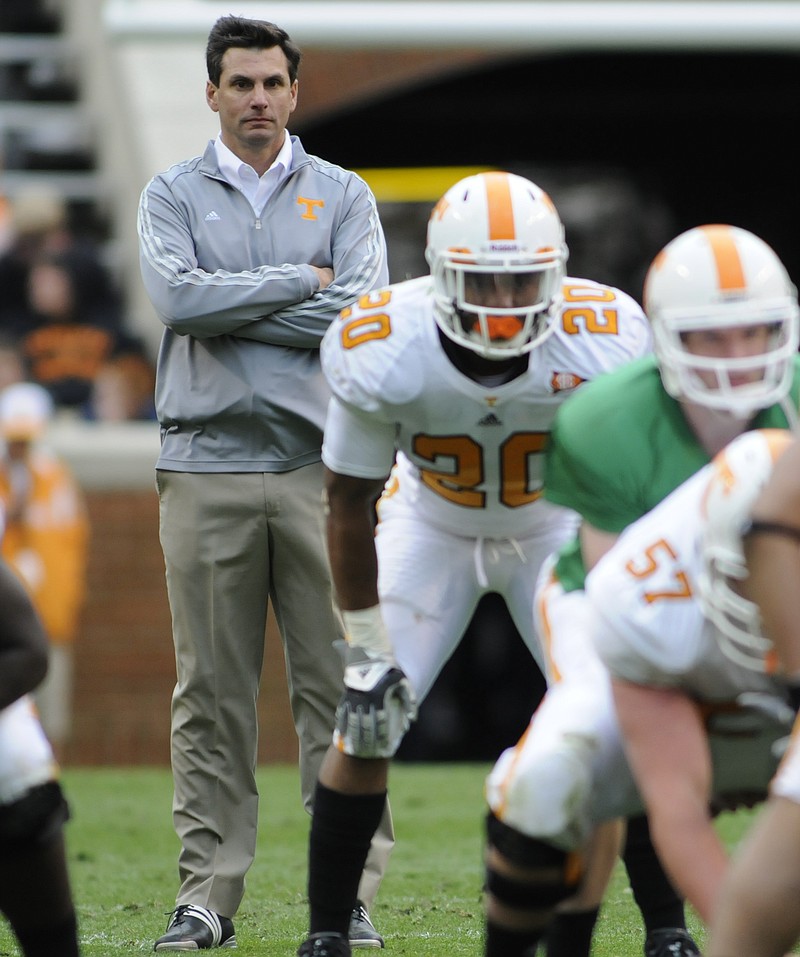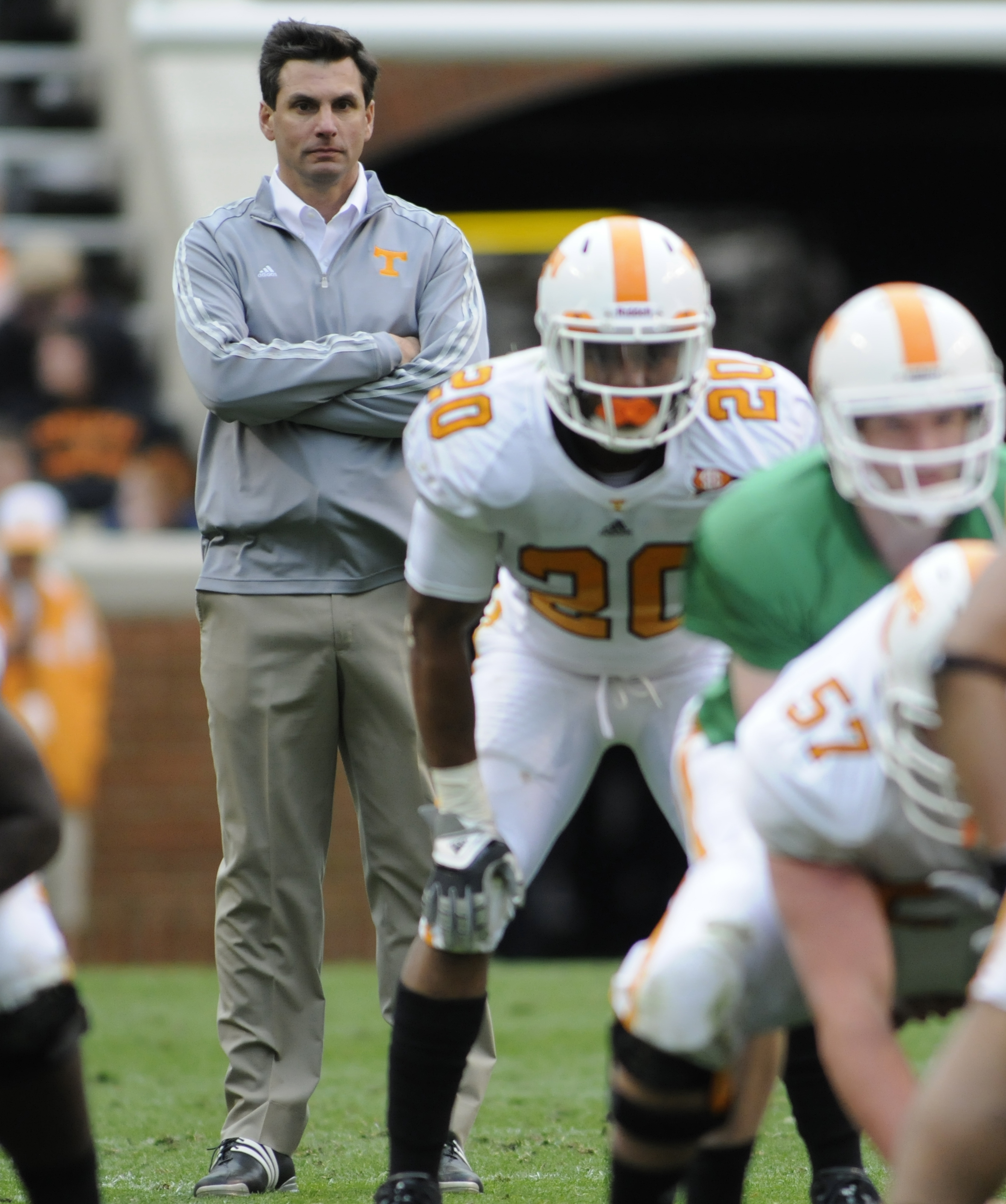KNOXVILLE - Since his arrival at Tennessee last summer, Malik Jackson never has had reservations about speaking his mind.
After one of UT's final spring practices, the Volunteers' senior defensive tackle was his usual straightforward self in describing his formula for being an effective leader.
"You can't be out there getting reached and having everybody run across the edge and getting screamed at by [the coaches], then you go over and tell somebody what to do," Jackson said. "That's just not the way it goes, so I mean I think it's 100 percent what you do on the field and the classroom. You can't be a stud out here and be an idiot in the classroom; you have to be an all-around good leader."
That's exactly what Jackson, one of just six seniors listed on UT's two-deep post-spring depth chart, is trying to be, and leadership is one of the bigger questions the Vols must address between now and September. Summer workouts began three weeks ago, and with freshmen and sophomores comprising more than 70 percent of the roster, finding leaders will be a challenge.
"You start with 'What is leadership?' It's affecting somebody in a positive way to me," coach Derek Dooley said in March. "Anybody can do that. Even your best leaders sometimes need leadership. To think that you're going to have all your leaders and everybody rallies around them this early in the season is unrealistic to me.
"I think the first thing you need to do to be a leader is you have to be a little bit of an example. So if you're not doing what you're supposed to do on and off the field, then it's hard for everyone else to respect you."
"Infant stages"
When UT begins preseason camp in August, it will do so with just nine scholarship seniors, and three of those - Jackson, backup quarterback Matt Simms and reserve defensive lineman Rae Sykes - are transfers with relatively little time in the program.
Two of the Vols' 14 juniors transferred in as well, and UT left spring practice with just 10 upperclassmen listed in starting positions. Recent Southeastern Conference champions Auburn, LSU and Alabama had 19, 18 and 14 those years.
Dooley spoke before spring practice of how he had to "re-center" his team's focus toward a common goal: winning and meeting the high expectations that come with playing football at UT.
The challenge then was doing so with a new group of players who had just experienced two coaching changes - the process of new coaches earning and building players' trust and the team adjusting to a third staff and learning a new system.
The challenge now, however, is enhancing team chemistry and leadership by aligning the focus on one particular goal with a team with more than 60 first- or second-year players.
"We're still [in the] infant stages," Dooley said Friday at the Bradley Sunrise Rotary Sunset Gala in Cleveland. "You've got to just remember we had 20-something more guys walk on campus a couple of weeks ago.
"We started what we call a freshman seminar. We would meet with them every week and start laying out some of our expectations of what it means to be a Tennessee football player and what the expectations are from how they represent and conduct themselves to the winning and traditions. We've begun that process with the freshmen as well, but we're continuing to do that with the upperclassmen. It just takes a lot of time."
"Nobody ready"
As much as UT's run from 2-6 to the Music City Bowl last season was fueled by a handful of true freshmen, the Vols would not have been able to make the run without their veterans.
Receivers Denarius Moore and Gerald Jones led through increased production, and defensive end Chris Walker and tight end Luke Stocker provided calming sources of stability. And linebacker Nick Reveiz was UT's heart and soul, as well as the Vols' defensive quarterback and leading tackler by a wide margin.
"People know what a great leader he was and how smart he was and how much he did for our defense before the ball was snapped," defensive coordinator Justin Wilcox said in April. "We're going to need the guys to pick up pieces of that - it's not going to be one person. There's nobody ready to do that right now."
Replicating Reveiz's leadership is difficult enough, but replacing his production might be even harder. The former walk-on, often overlooked because of his size (5-foot-10, 224 pounds), led UT with 108 tackles last season. Junior linebacker Herman Lathers was second with 75.
"I don't know if there's a guy that's going to get 100 [this year]," Wilcox said. "I hope so, but if not, we need to pick up 30, 40 [or] 50 from other guys on our defense, especially at linebacker to make up for his production because he was such a productive player."
Lathers' injury, a fractured ankle suffered earlier this month, makes the void at linebacker even bigger and puts even more pressure on freshmen A.J. Johnson and Curt Maggitt to be ready to play immediately. There are enough veterans, both at linebacker and on the overall defense, to show the handful of talented newcomers how to work and the level of commitment required to meet the required expectations.
Those upperclassmen, though, also will have to fend off the newcomers expected to come in and immediately compete for spots on the two-deep list, and some of them raised their level of play and leadership responsibilities during the spring.
"There's a few guys that have picked up the slack," said Wilcox, who singled out Jackson on the line, seniors Austin Johnson and Daryl Vereen at linebacker and sophomore safety Brent Brewer and junior cornerback Prentiss Waggner.
"I don't know if there's anybody. There's not, there's nobody that could do it right now the way Nick did last year. Wilcox said. "That's OK, but we need certain guys at certain positions to take those groups. Those guys have got to push the envelope because they're going to be counted on to provide leadership for us."
"How it is"
Leading by example sounds simple enough: Play well on Saturdays, be attentive in meetings and do well academically. The focus, however, can't be totally directed inward.
Vocal prodding is generally considered the most effective and noticeable way to be a leader, but it's just one form of positively affecting others and earning teammates' respect.
For some players, playing well is the loudest and most effective way they can lead. Senior tailback Tauren Poole, a self-professed quiet guy, reiterated throughout last season that it is his preferred way of leading, and the Vols' eldest offensive starter isn't alone.
"I'm not a real big talkative guy," Brewer said in April. "I like to try to go out there and play and show the other players that I'm out here to work and win for them and win with them."
Jackson admitted he's the same way - "I'm not going to scream at you," he said after a March practice - but while different leaders have different styles, performance is the foundation.
"I think [it happens] over time because you've got to prove it - you just can't say it," Jackson said. "That's what spring ball [is for]. After spring ball we're going to get evaluated and the people who played well are going to have a lot of more leeway to say stuff, and the people who didn't kind of have to hush up and be quiet. A lot of respect comes from the field: If you're not doing good out here, then you can't say nothing upstairs.
"That's just how it is."
"Reality of it"
Summer workouts, when coaches aren't allowed to work on the field with their players, provide excellent opportunities for leaders to emerge. The dedication the players demonstrate to their teammates is a way to earn respect.
"When you prove it," Wilcox said, "is in the offseason workouts, so your teammates see the way you work, the way you prepare in meetings, what you do off the field, how you handle yourself. You've got to be a productive player, and that's just a reality of it. You've got to be able to prove that."
On an offense where Poole and tackle Dallas Thomas, a fourth-year junior, are the only upperclassmen projected to start, quarterback Tyler Bray might have to shoulder part of the load. Bray's physical talents have never been in question, but the soft-spoken sophomore exited spring practice still needing to develop the level of commitment to being a great quarterback in a league loaded with defensive talent.
The lanky, 6-foot-6 Californian said after the spring game that his position requires him to be a leader, and his coach said Friday he's turned those words into action so far this summer.
"What I can tell you is his investment into being better has been phenomenal," Dooley said. "He's working extremely hard. I think he's showing great leadership out there in conducting the voluntary workouts. [That] is what I hear, and that's all I'm concerned about."
Unfortunately for Dooley, hearing is all he can do while NCAA rules prohibit coaches from providing any on-field instruction. Strength coach Ron McKeefery, in his first year at UT after a decade at South Florida and a brief stint with the U.S. Army Special Forces, has the responsibility of handling an important stretch when teams create chemistry and discover leaders for the fall.
"That's what we all wanted him to focus on [- team-building]. Ron's been great at that," Dooley said. "This is the hardest time for a coach because you have eight weeks here where your team is training, and it's so important they come back way ahead of where they were when they left spring practice. You're really at the mercy of the strength coaches.
"It's a reason why, and everybody says, 'How did these strength coaches start getting paid this way?' or 'Why is it so important this coach wants a certain strength coach?' Well, this is when you really feel it. They're the pulse of the team, they're with them every day, they're maintaining good morale and getting them better, and that's a difficult task."
For Dooley, leadership and team chemistry go hand-in-hand. The 6-foot-5, 270-pound Jackson, who transferred from Southern Cal last July, began his junior season at defensive end and flourished following a midseason switch to tackle.
Realizing his responsibility, Jackson helped an inexperienced group of defensive linemen this spring, whether it was sharing pointers in practice, helping them with the playbook or simply pushing guys to get better.
Even with those efforts, Jackson still is adapting his style to the task.
"When people are messing up, kind of lackadaisical, I just try to get on their heads," he said. "I think they're starting to see that. I've got to learn to not be so conscious about what guys are saying - just say it. I'm a senior now and I don't think anybody's going to have too much of a problem with what I say. I've just got to go in that role and get more comfortable with saying stuff and just being a leader with these guys."

